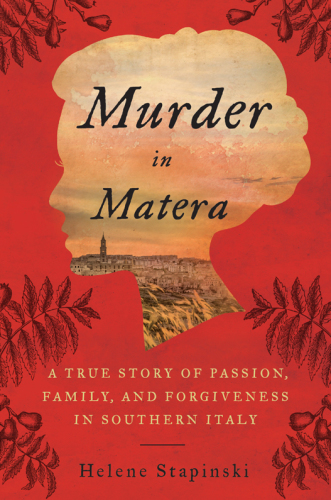
Murder In Matera
A True Story of Passion, Family, and Forgiveness in Southern Italy
کتاب های مرتبط
- اطلاعات
- نقد و بررسی
- دیدگاه کاربران
نقد و بررسی

March 6, 2017
Italian-American author Stapinski (Five-Finger Discount: A Crooked Family History) mines her immigrant family’s roots to write a part memoir, part murder mystery that is entertaining in its plot if not elevating in its prose (“Ma would tell me about Vita as we sat in our bright yellow kitchen in Jersey City, New Jersey, circa 1969”). Combining nonfiction reportage and family history, Stapinski retells her decadelong search for the truth about the early life of her great-great-grandmother Vita and the murder she allegedly committed nearly two hundred years ago in her small Basilicata village before fleeing to the United States. The author posits that the darker side of her genealogy may have consequences for her own family: “All of us, I thought, are made up not only of what we know, but of all that we don’t know as well,” she writes—as if the violence, revenge, and curses that accrued along with ignorance and poverty in Southern Italy in the 19th-century are somehow transmitted through DNA. The book—enlivened by anecdotes about Italian culture—will appeal to armchair travelers who long to visit the caves and culture of Matera.

April 1, 2017
Stapinski (English/Fordham Univ.; Baby Plays Around: A Love Affair, with Music, 2004, etc.) continues her investigation into her family's checkered past.The narrative begins as an enticing page-turner, an investigative jewel sending readers racing to the next clue, as the author strikes out to find the truth about her great-great-grandmother Vita, "a murderess." A trip to Stapinski's ancestral home, Bernalda, in the Basilicata region of Italy's instep, with her mother produced little information and a warning from hostile locals to let the past die. The oral history, jumbled and changed over generations, declared that Vita left for America in 1892 with three children, all from different fathers, losing one on the trip. At the time, a woman traveling without her husband was highly unusual, and the tales that Vita had committed murder compounded the mystery. Stapinski was fearful that her family, and her children, might carry the so-called "warrior gene." Was the history of aggressive and criminal behavior in her genes unavoidable? Ten years after her first visit, the author headed back to Bernalda, this time equipped with research assistants and translators. A series of serendipitous encounters and acquaintances led Stapinski to a lawyer who knew the workings of the local legal system and, most importantly, steered her to Potenza, where a murder trial would have taken place. After, more digging into documents and local lore led to further questions and few concrete answers. Where were the fathers when Vita's children were born? How did she lose one of her children? The author includes a cast of characters for "Now" and "Then," and many of them are vivid and colorful in their own rights, but by the end, the narrative becomes overly imaginative, not grounded enough to satisfy as investigative history. The book begins as a rollicking, magical tale but eventually bogs down in too much conjecture.
COPYRIGHT(2017) Kirkus Reviews, ALL RIGHTS RESERVED.

April 15, 2017
Here, writer Stapinski (Five-Finger Discount) pursues the study of her family's criminal genealogy with unexpected emotional results. Having grown up with tales of roguish relatives and even a murder, the author began a ten-year search for the facts of the alleged murder involving her great-great-grandparents Vita and Francesco. The venture required multiple trips to Basilicata, a southern Italian region with colorful inhabitants and a dismal past. Despite initial roadblocks, interviews were conducted and a valuable criminal file and archival information unearthed. Revelations about the murder itself, Francesco's incarceration and demise, and Vita's new life with a wealthier man of surprising significance to the family are engagingly conveyed. The author also reconstructs the harrowing details of Vita's journey to America in 1892, including the loss of a child. The book concludes with a testimony of gratitude and admiration for Vita rather than shame for any misdeeds. VERDICT Combining elements of a travelog about an unlikely tourist destination, quirky family history, and a thrilling detective story, this entertaining memoir should appeal to fans of the author's earlier work and general readers interested in immigration history.--Antoinette Brinkman, formerly with Southwest Indiana Mental Health Ctr. Lib., Ev ansville
Copyright 2017 Library Journal, LLC Used with permission.

























دیدگاه کاربران